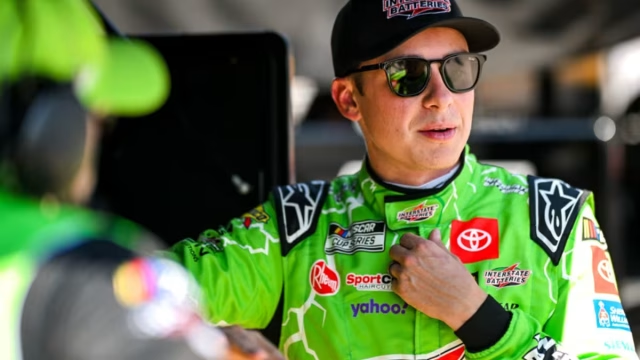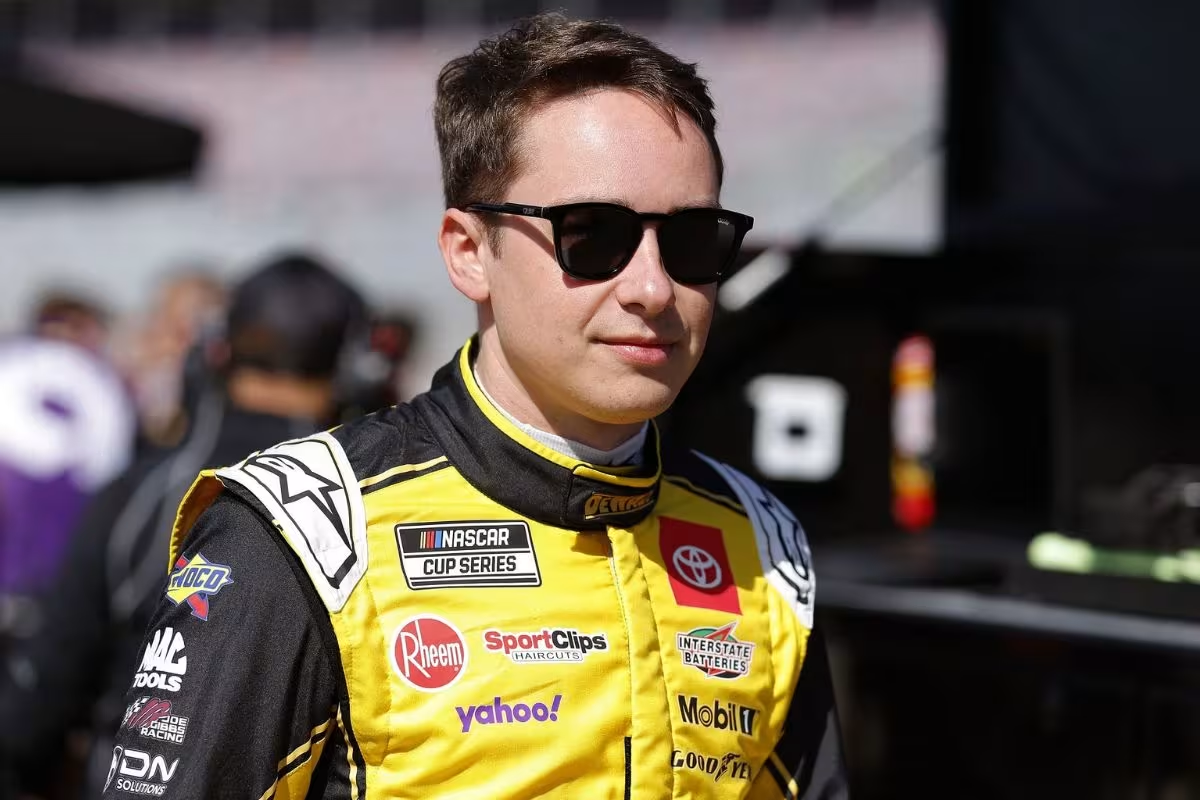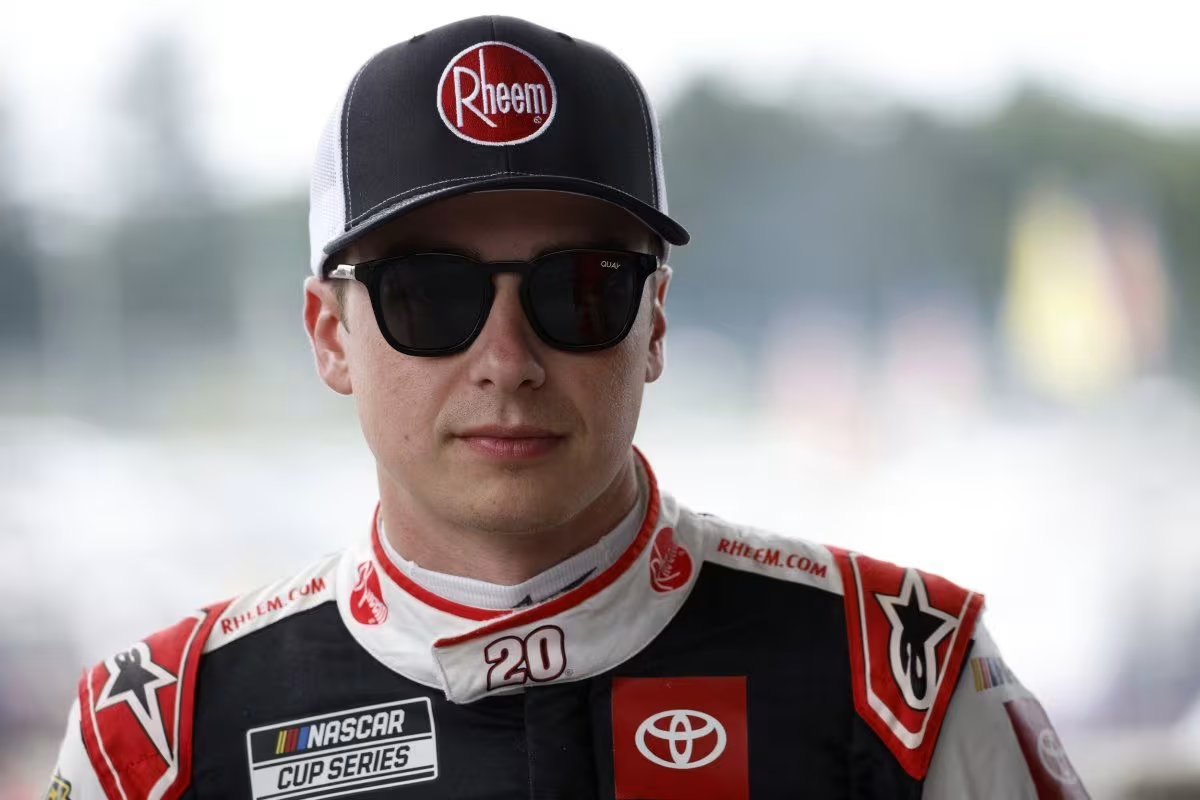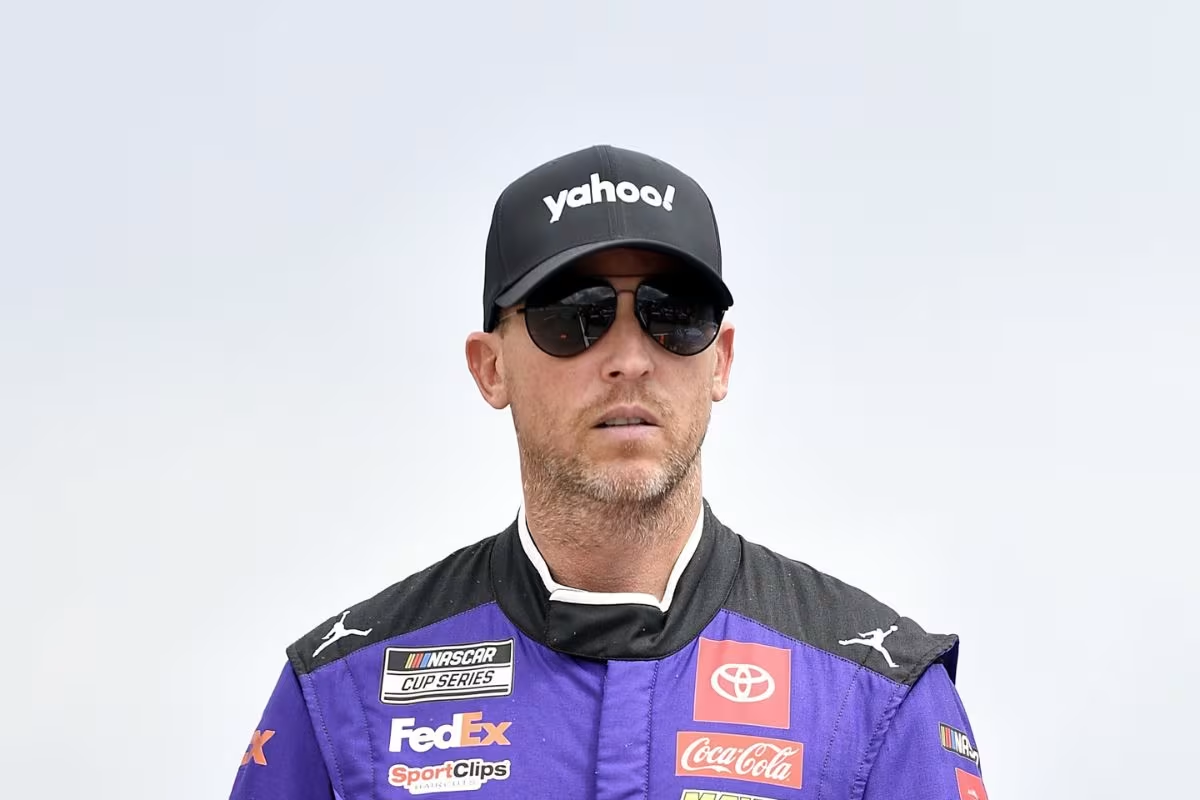Rookie Mistakes Haunt Christopher Bell: Christopher Bell‘s recent performance at Kansas Speedway has sparked a critical dialogue regarding his abilities and decision-making under duress, particularly in the context of the playoffs. Despite leading a considerable portion of the race, Bell’s struggles with control and subsequent errors have led crew chief Freddie Kraft to question his comprehensive talent level. This situation invites an analysis of whether Bell’s challenges stem from a lack of skill or an inability to adapt to competitive racing.
Key Highlights
- Christopher Bell’s struggles in the Kansas racetrack included multiple contacts with the wall, raising concerns about his control and decision-making under pressure.
- Crew chief Freddie Kraft criticized Bell’s performance, suggesting he needs to reassess his talent management and driving approach.
- Bell’s critical mistakes early in the race severely affected his playoff standing, highlighting ongoing issues with consistency and mental fortitude.
- Non-playoff drivers showed aggressive strategies, contrasting with Bell’s pressures, which may have influenced his performance dynamics.
- There are growing doubts about Bell’s competitive edge, as recent performances have displayed a decline from his previous successes.
Christopher Bell’s Kansas Playoff Struggles
Christopher Bell’s playoff struggles at Kansas Speedway highlight the intense strain faced by drivers in racing situations. Securing a pole position set high expectations for Bell, who aimed for his fourth win of the season. However, the reality of the race unfolded differently, as unforced errors and rookie mistakes blemished his performance, ultimately resulting in a disappointing P7 finish.
This outcome raises significant questions regarding the mental and competitive tensions inherent in playoff racing. The weight of expectation can be a double-edged sword. While it can enhance performance, it can also lead to critical missteps. For Bell, the stress to perform alongside seasoned playoff contenders may have contributed to lapses in concentration and execution.
His failure to hit essential markers during the race is indicative of how strain can impact decision-making and overall performance on the track. In the broader context of the NASCAR playoffs, it is evident that drivers are not only racing against each other but also grappling with the psychological burden of their aspirations.
Bell, a driver known for his talent, faced a formidable challenge at Kansas, where even the slightest error can have important ramifications for championship aspirations. The Kansas race serves as a poignant reminder that talent alone is insufficient; mental fortitude and the ability to manage strain are similarly crucial components for success in the playoffs.
Bell’s Race Control and Wall Contact Issues
The struggles faced by Bell at Kansas Speedway extend beyond psychological strain to encompass considerable issues with race control and wall contact. While Bell exhibited the speed of the #20 Toyota Camry by leading an impressive 122 laps, his inability to maintain control ultimately hindered his performance.
The race was blemished by repeated brushes with the outside wall, as Bell made contact not just once, but twice. These incidents reveal a troubling trend that may call into question his racecraft and ability to navigate high-stress situations effectively.
The consequences of such wall contact are multifaceted. To begin with, it compromises vehicle integrity, leading to potential handling issues that can escalate throughout the race. Additionally, frequent wall contact can disrupt a driver’s rhythm, forcing them to alter their driving style and approach, thereby diminishing overall performance.
Observers, including Bubba Wallace’s spotter Freddie Kraft, have voiced concerns regarding Bell’s racing capabilities, suggesting that his recent performances may indicate a deeper issue with talent and adaptability under competitive strain.
Moreover, the context of the race must be considered; while others, such as Denny Hamlin and Kyle Busch, faced their own tribulations, Bell’s challenges were marked by a lack of precision. This contrast highlights the importance of race control in achieving consistent results.
Stage 1 and Stage 2 Mistakes
Throughout the race, critical mistakes during Stage 1 and Stage 2 severely impacted Bell’s total performance and playoff aspirations. Leading 71 laps and in a strong position to secure a stage win, Bell faced a formidable challenge from William Byron. As the strain mounted, Bell’s inability to maintain control resulted in a costly collision with the wall in Turns 1 and 2, relegating him from the lead to a disappointing fifth position. This moment not only stripped him of valuable stage points but also set a negative tone for the remainder of the race.
The ramifications of Bell’s missteps continued into Stage 2. Opting to stay out during a caution period, Bell aimed to capitalize on stage points. However, his struggles persisted. Exiting Turn 4, his car again lost stability, leading to another wall contact that proved detrimental. This mistake not only solidified his inability to gain points but also allowed Alex Bowman to seize his initial stage victory of the season. By the end of the stage, Bell found himself languishing in 16th position, a glaring contrast to the ambitions he had set for the race.
These errors highlight a troubling pattern in Bell’s performance under strain. The stakes of playoff races demand precision and composure, qualities that Bell failed to exhibit during these critical stages. Moving forward, addressing these lapses will be crucial for Bell if he hopes to remain a contender in the playoffs.
Bell’s P7 Finish and Criticism from Kraft
Resilience in the face of adversity can often define a driver’s path, and for Christopher Bell, a P7 finish amidst criticism highlights both his potential and his limitations.
Despite the challenges he faced during the race, including two collisions with the wall, Bell managed to secure a respectable position, placing him third in the playoff standings and 28 points above the cutline. This achievement, however, comes with an undercurrent of scrutiny, particularly from his crew chief, Freddie Kraft.
“He’s fast and ran out of talent.”- Kraft
Kraft’s comments, suggesting that Bell is “fast but ran out of talent,” raise notable questions about the driver’s ability to manage stress and maintain consistency. While the P7 finish may seem commendable, it masks the reality that Bell left valuable points on the table, a critical consideration in the environment of NASCAR playoffs.
Competitors such as Kyle Larson, Denny Hamlin, and Chase Elliott also struggled, but Bell’s performance was distinctly scrutinized due to his control over his situation.
“Looking at the playoff bubble at the moment, it seems like some of our drivers had some trouble, such as Christopher Bell, although he managed to still get a strong day. He did hit the wall twice.” Casey
The contrast of Bell’s speed and his apparent inability to avoid mistakes evokes a deeper dialogue about the mental fortitude required at this level of racing. As he navigates the complexities of the playoff landscape, Bell must reconcile his evident talent with the execution required to capitalize on it.
Non-Playoff Drivers Taking Risks and Hamlin’s View
Recognizing the unique dynamics of NASCAR playoffs, non-playoff drivers are capitalizing on their freedom from the demands of rivalry, allowing them to adopt a more aggressive racing strategy. This shift is evident as drivers like Chris Buescher and Ross Chastain, unencumbered by playoff strains, have secured notable victories. Their ability to focus solely on winning, rather than accumulating stage points, positions them advantageously against playoff contenders who must tread cautiously.
Denny Hamlin articulates this divergence in strategy well on his podcast, noting that non-playoff drivers can utilize their risk-taking behaviors to outpace their playoff counterparts. He emphasizes the contrast in mentality, as playoff teams typically adopt a conservative approach to guarantee they advance in the championship chase.
“That’s the advantage that the non-playoff drivers will have that they don’t care about the stage points. You’re going to see us at the Roval and all these racetracks, selling out for stage points. What happens is that all the cars that flip are going to end up front. They’re going to be the ones racing for a win, not the playoff cars. Teams become more conservative in the playoffs; I know it’s the unpopular opinion, but it’s totally true.” – Hamlin
As the Talladega race approaches, teams are poised to recalibrate their strategies. The non-playoff drivers, with their reduced stakes, present a compelling narrative; they are now potential spoilers, ready to capitalize on any mistake from the playoff field. This dynamic sets the stage for an unpredictable and thrilling race, where the absence of strain may very well dictate the outcome.
News in Brief: Rookie Mistakes Haunt Christopher Bell
The performance of Christopher Bell at Kansas Speedway has raised considerable concerns regarding his ability to manage stress during critical playoff scenarios. Despite leading a substantial number of laps, mistakes in race control and contact with the wall undermined his efforts. The commentary from crew chief Freddie Kraft highlights the necessity for Bell to reassess his approach to racing under pressure. Ultimately, the question remains whether these challenges stem from a lack of talent or an inability to adapt tactically in high-stakes situations.
ALSO READ: Christopher Bell Secures Hollywood Casino 400 Pole: Can He Convert It to Victory?



